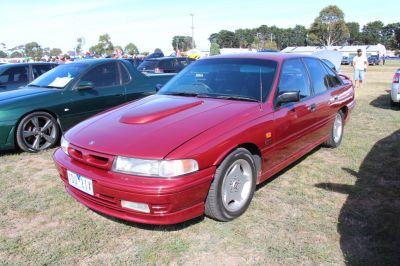 1991 Toyota Aristo (S14) Dimensions, Size & Specs
1991 Toyota Aristo (S14) Dimensions, Size & SpecsMeasurements of the 1991 Toyota Aristo, engineered for optimal performance and comfort
| Dimensions | |
|---|---|
| Length: | 4865 mm191.5 in16.0 ft |
| Width: | 1795 mm70.7 in5.9 ft |
| Height: | 1420 mm55.9 in4.7 ft |
| Trunk Capacity: | 404 liter14.3 cu ft |
| Weight Specifications | |
| Curb Weight: | 1570-1680 kg3461-3704 lbs |
| Maximal permitted Weight: | 1845-1955 kg4068-4310 lbs |
| Tire Specifications | |
| Tire Sizes: |
|
The Toyota Aristo (S14), produced from 1991 to 1997, is a sedan that exemplifies Japanese automotive design and engineering of the early 1990s. With a length of 4865 mm (191.5 inches), a width of 1795 mm (70.7 inches), and a height of 1420 mm (55.9 inches), the Aristo (S14) offers a balanced combination of spaciousness and elegant silhouette suited for executive transport and comfortable everyday use. The vehicle's curb weight ranges between 1570 and 1680 kilograms (3462 to 3704 pounds), depending on variant and options, while its maximum permissible weight is between 1845 and 1955 kilograms (4067 to 4309 pounds). This makes the Aristo a solid and stable sedan with a substantial presence on the road. The luggage compartment offers a decent size of 404 liters (14.3 cubic feet), sufficient for daily errands or longer trips. Tire options for this generation included 215/65 R15 and 225/55 R15 V sizes, ensuring good grip and ride comfort for its class. The Aristo S14 bridges performance and luxury, serving as Toyota's answer to premium sedans in the 1990s market. Its dimensions place it firmly within the mid-to-full-size sedan segment, offering drivers a spacious cabin while maintaining manageable exterior proportions for urban and highway driving. These characteristics, paired with Toyota's reputation for reliability, make the Aristo (S14) a noteworthy vehicle for enthusiasts interested in classic Japanese sedans.
Discover the standout features that make the 1991 Toyota Aristo a leader in its class
Have a question? Please check our knowledgebase first.
The Toyota Aristo (S14), produced between 1991 and 1997, is a mid-size sedan with the following dimensions: It measures 4865 mm (191.5 inches) in length, providing a spacious profile on the road. The width is 1795 mm (70.7 inches), offering a balanced stance while maintaining suitable clearance for most parking spaces. The vehicle's height stands at 1420 mm (55.9 inches), which gives it a sleek sedan silhouette, enhancing both aerodynamics and style.
The curb weight of the Toyota Aristo (S14) ranges from 1570 to 1680 kg (approximately 3,461 to 3,704 lbs). This weight range contributes to a stable and comfortable driving experience, offering sufficient heft for stability at higher speeds, while remaining light enough to provide responsive handling. The specific weight depends on the variant and equipment level, with heavier models offering enhanced features that may add to overall mass. The balance between weight and power in the Aristo (S14) helps it deliver refined acceleration and efficient cruising.
With a width of 1795 mm (70.7 inches), the Toyota Aristo (S14) fits comfortably within most standard parking spaces and garages. Standard single-car garage widths are typically around 2440 mm (96 inches) or more, allowing the Aristo to fit without difficulty and with room to open doors. Its width strikes a good balance between road presence and practicality, enabling drivers to navigate urban environments and parking areas with ease.
The Toyota Aristo (S14) offers a luggage capacity of 404 liters (about 14.3 cubic feet). This trunk space is adequate for everyday needs such as grocery shopping, brief luggage for travel, or carrying sports equipment. While it is not as expansive as a large SUV or station wagon, the boot provides practical utility for a mid-size sedan, allowing owners to transport a reasonable amount of cargo without compromising passenger comfort.
The Toyota Aristo (S14) comes equipped with tire size options of 215/65 R15 and 225/55 R15 V. The 215/65 R15 tires offer a taller sidewall, which can enhance ride comfort by absorbing road imperfections better. In contrast, the 225/55 R15 tires provide a wider contact patch and lower sidewall, improving grip and handling responsiveness, especially at higher speeds. These options enable the Aristo to cater to different driving preferences, balancing comfort and sportiness.
Yes, the Toyota Aristo (S14) fits comfortably inside a typical residential garage. Most standard garage spaces measure approximately 2.4 meters (7.9 feet) wide, 4.8 to 6 meters (15.7 to 19.7 feet) deep, and over 2 meters (6.5 feet) tall. With a length of 4865 mm (191.5 inches / 15.8 feet), width of 1795 mm (70.7 inches / 5.9 feet), and height of 1420 mm (55.9 inches / 4.6 feet), the Aristo leaves sufficient clearance within these dimensions. Owners can securely park the vehicle and still have room for opening doors and movement around it.
The Toyota Aristo (S14) succeeded the first generation Aristo (S130) and featured a modest increase in overall size and weight. The S14 model measures 4865 mm in length compared to the S130’s shorter dimension, providing more interior space and enhanced road presence. Width and height dimensions were also increased slightly to improve cabin comfort and stability. Regarding weight, the S14’s curb weight ranges between 1570 and 1680 kg, which is somewhat heavier than the earlier generation, reflecting added features and improved structural elements designed for safety and luxury. This evolution marks a step forward in refinement, comfort, and driving dynamics.
When compared to other mid-size luxury sedans from the early 1990s, such as the Lexus GS and Nissan Cefiro, the Toyota Aristo (S14) holds its own with competitive dimensions. Its length of 4865 mm (191.5 inches) is relatively generous, offering ample passenger space and trunk volume. The width of 1795 mm (70.7 inches) makes it neither too bulky for city driving nor too narrow to impact interior comfort. With a height of 1420 mm (55.9 inches), it maintains a sleek, aerodynamic profile similar to rivals. Overall, the Aristo (S14) aligns well within its class, balancing space, comfort, and driver engagement.
The maximum permissible weight (gross vehicle weight rating, GVWR) of the Toyota Aristo (S14) ranges between 1845 and 1955 kg (approximately 4,068 to 4,309 lbs), depending on the variant. This rating includes the vehicle's curb weight plus passengers, cargo, and fuel. The difference between max permissible weight and curb weight typically indicates the payload capacity. With curb weights between 1570 to 1680 kg, the Aristo can carry a useful load capacity of roughly 275 to 385 kg (606 to 848 lbs), accommodating multiple passengers and luggage without overloading, ensuring safety and optimal vehicle performance.
The Toyota Aristo (S14) stands out with its combination of elegant design and advanced engineering for the early 1990s. It features clean, aerodynamic lines and a sophisticated sedan profile that balances luxury and performance. Engineering-wise, it is notable for offering powerful inline-six engines, some equipped with turbocharging, which was advanced for its class at the time. The chassis and suspension are tuned to provide a blend of comfort and sporty handling, catering to drivers who value both smooth ride quality and dynamic driving. The S14 also included modern amenities and safety features, elevating the driving experience to meet premium standards of the era.
Discover similar sized cars.

| Production: | 1969-1978 |
|---|---|
| Model Year: | 1969 |
| Length: | 4907 mm193.2 in |
| Width: | 1852 mm72.9 in |
| Height: | 1450 mm57.1 in |

| Production: | 1969-1978 |
|---|---|
| Model Year: | 1969 |
| Length: | 4920 mm193.7 in |
| Width: | 1852 mm72.9 in |
| Height: | 1450 mm57.1 in |

| Production: | 1983-1991 |
|---|---|
| Model Year: | 1983 |
| Length: | 4793-4913 mm188.7-193.4 in |
| Width: | 1814 mm71.4 in |
| Height: | 1422 mm56.0 in |

| Production: | 1988-1994 |
|---|---|
| Model Year: | 1989 |
| Length: | 4874 mm191.9 in |
| Width: | 1814 mm71.4 in |
| Height: | 1420 mm55.9 in |

| Production: | 1990-1993 |
|---|---|
| Model Year: | 1990 |
| Length: | 4865 mm191.5 in |
| Width: | 1812 mm71.3 in |
| Height: | 1403 mm55.2 in |

| Production: | 1992-1995 |
|---|---|
| Model Year: | 1992 |
| Length: | 4830 mm190.2 in |
| Width: | 1775 mm69.9 in |
| Height: | 1375 mm54.1 in |

| Production: | 1994-2000 |
|---|---|
| Model Year: | 1992 |
| Length: | 4790-4805 mm188.6-189.2 in |
| Width: | 1730-1746 mm68.1-68.7 in |
| Height: | 1360 mm53.5 in |

| Production: | 1994-1998 |
|---|---|
| Model Year: | 1994 |
| Length: | 4825-4878 mm190.0-192.0 in |
| Width: | 1760-1875 mm69.3-73.8 in |
| Height: | 1388-1402 mm54.6-55.2 in |
